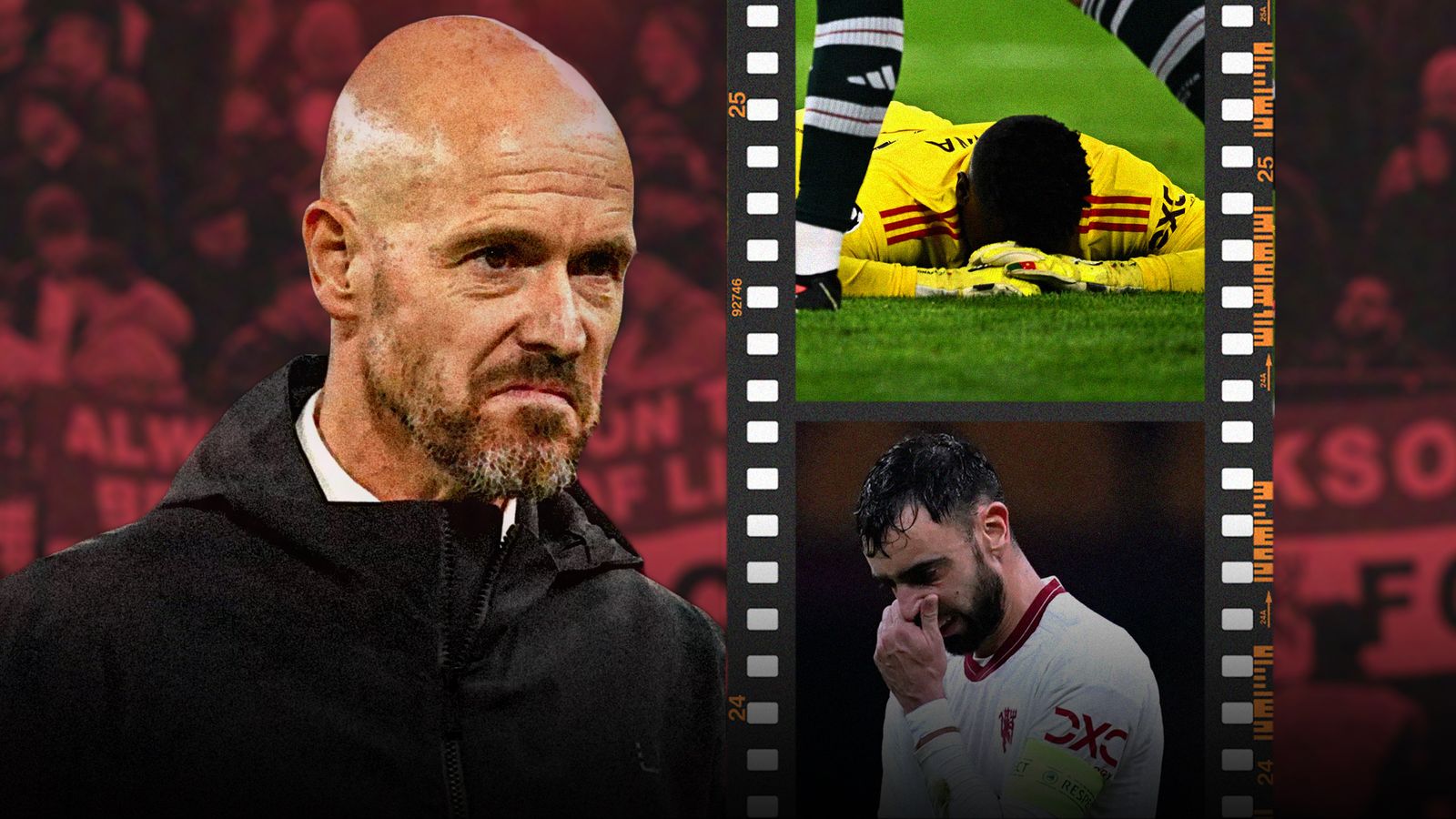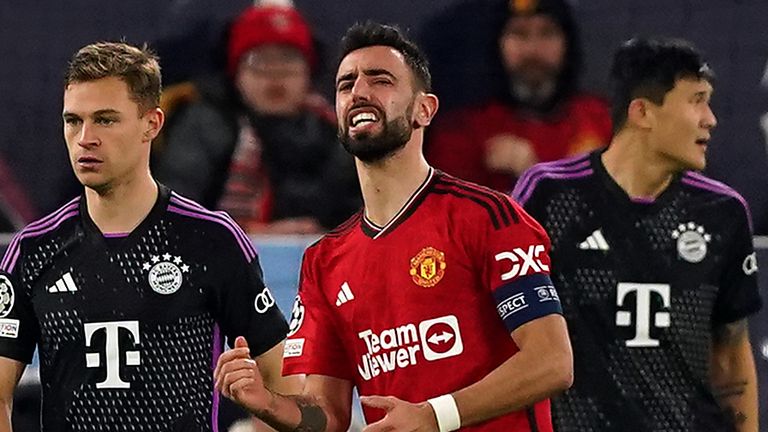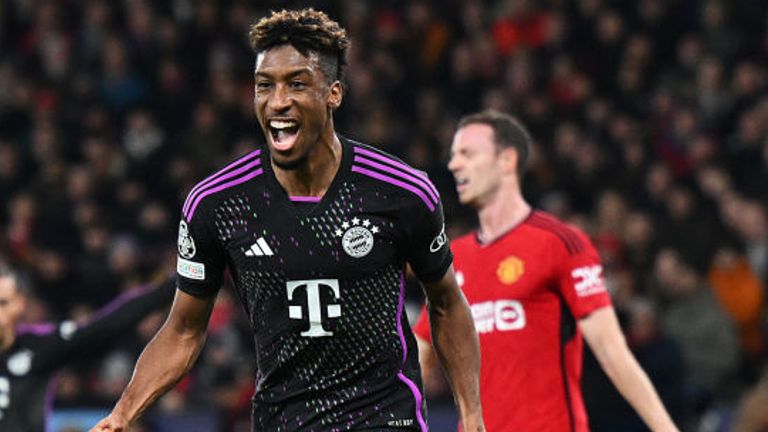Manchester United are out of Europe, beaten by Bayern Munich for the second time this season. It was the defeats to Copenhagen and Galatasaray that left them with too much to do. Not just eliminated from the Champions League but bottom of the group.
From the tragedy to the triumph, European nights are part of what makes this club special. The statues of Sir Bobby Charlton, George Best and Denis Law celebrate the 1968 success. The visit of Bayern Munich brings to mind that most magical of moments in 1999.
Jose Mourinho downplayed that ‘football heritage’ by highlighting their more recent record but he still managed to negotiate the Champions League group stage in each of his two attempts. Even that modest ambition proved beyond Erik ten Hag’s team.
The draw was kind. Bayern’s pedigree is obvious but Copenhagen and Galatasaray offered a clear path to the next stage. Instead, United depart having not only been beaten by all three opponents but with no team in the competition having conceded more goals.
This should not be possible, the Champions League is structured to prevent such a failure for the game’s richest clubs. The wealthiest three sides in Spain and Germany had progressed with a game to spare with Inter, Arsenal and Manchester City joining them too.
This was no nightmare of a group, not the gauntlet that Newcastle had to run. And yet, Manchester United contrived to find demons where there were none. Their only victory in six attempts needed a stoppage-time penalty save from Andre Onana.
“When we are at our best we can do it,” Ten Hag had said beforehand. “We prepare ourselves for the best United team,” noted Thomas Tuchel. “When they are good, they are really, really good.” As the old nursery rhyme goes, when they are bad, they are horrid.
This was not United at their worst. They appeared motivated and were full of energy when chasing the ball and making Bayern uncomfortable for an hour. Quality was lacking, however, and the German side had asserted their superiority long before the end.
It was a frustrating watch, the gulf glaring. There is little appetite for Ten Hag’s exit among influential voices but he will need more substance and he will need it soon. Partnerships on the pitch, the promise of players improving, the emergence of a spine around which selection, and supporters’ hopes, can be built.
On this evidence, it is hard to know where to start.
Scott McTominay and Sofyan Amrabat are among those who seem too limited. Alejandro Garnacho has excited the United fans but he did not have the trickery to find a way through here. He is a teenager, after all. Rasmus Hojlund, 20, struggled to hold the ball up.
Hojlund has done better than his team in this Champions League campaign but the bigger picture is that he has scored only nine career goals in a major league. His Bayern counterpart Harry Kane managed to hit that total in just three weeks recently.
Myriad off-field issues have been a complication. Injuries have pushed United into using so many youngsters. It is a mitigating factor. But there would be more enthusiasm about possible progress if there were clearer signs of ideas taking shape, a sense that time and transfers were the only obstacles to success.
McTominay was adamant that his manager has not lost the dressing room – and they played with enough commitment to suggest as much. But if players are giving their all, it raises other questions.
Speaking to Ten Hag about his vision earlier this season, he was clear. “We want to dominate opponents, we want to play proactive football, we want to play dynamic football,” he told Sky Sports. “Pressing is a part of it. The in-possession stuff also has to be right.”
The pressing part could be seen against Bayern. They harried them from the outset, committing players high up the pitch and occasionally troubling their illustrious opponents, winning throw-ins in advanced areas. It helped to get the crowd right behind them.
Ten Hag has repeatedly pointed to his team’s pressing statistics – and with good reason. Manchester United have had more high turnovers – defined as events where they have won the ball within 40 metres of the opposition goal – than any other side this season.
Encouragingly, they have also had more shots resulting from these turnovers than any other team. These are the sort of things that top teams do. But it is only a small part and when taken in conjunction with other aspects might even be considered part of the problem.
When that press has been broken, gaps have been exposed. One midfielder has been left covering wide expanses of space. A back line less than committed to defending high, perhaps cautious because of their own lack of pace, has only exacerbated the issue.
The counter-attack, such a weapon for Bournemouth throughout their 3-0 win at Old Trafford on Saturday, remains a concern. United have conceded nine goals from fast breaks since the start of last season, the third-most of any team since Ten Hag took over.
In possession, this is not a team that feels like it is 18 months into a manager’s journey. Building from the back remains a struggle, a regular source of confusion rather than creation. Even when calamity is avoided, attempts to play through are abandoned.
Measuring the number of pass sequences of 10 or more might seem a crude way of calculating a team’s ability to build play – it says nothing about their ball progression – but it still teases out the truth that United cannot keep the ball like their rivals.
Along with Roberto De Zerbi’s Brighton, famed for their possession game, it is Manchester City, Arsenal and Liverpool who make up the top four for such pass sequences. United are languishing in ninth on that list, well behind these three favourites for the title.
Often, it breaks down in midfield. Casemiro found it rather easier when flanked by Luka Modric and Toni Kroos. Amrabat can appear sluggish when asked to play on the half turn. Kobbie Mainoo has shown promise but whoever operates there needs more help.
Bruno Fernandes operates too high to construct from deep. Mason Mount is a player with neither the inclination nor the ability to do this side of the game. McTominay, for all his endeavour, is averaging only 25 successful passes per 90 minutes this season.
Given this set-up, it is hardly surprising that United have struggled for control and that has been a particular problem in the Champions League. Allowing a two-goal lead to slip is careless but for it to happen twice – against Galatasaray and Copenhagen – was costly.
Bayern did not even need a second goal at Old Trafford. They were not at their ruthless best, nor did they need to be with top spot assured. They have bigger challenges ahead in this competition. United’s task is just to return to it. But when will that be?
Upon the final whistle, there was a smattering of boos, the sound of seats clattering and supporters shuffling quietly into the night. They had done their grieving after Galatasaray. Out of hope long before the final whistle and out of Europe before Christmas.
It is not how things should be for Manchester United given their means but it is the reality to which they have become accustomed. A decade of disappointment. A club contemplating the need to turn another corner. But with no idea in what direction they are going.



